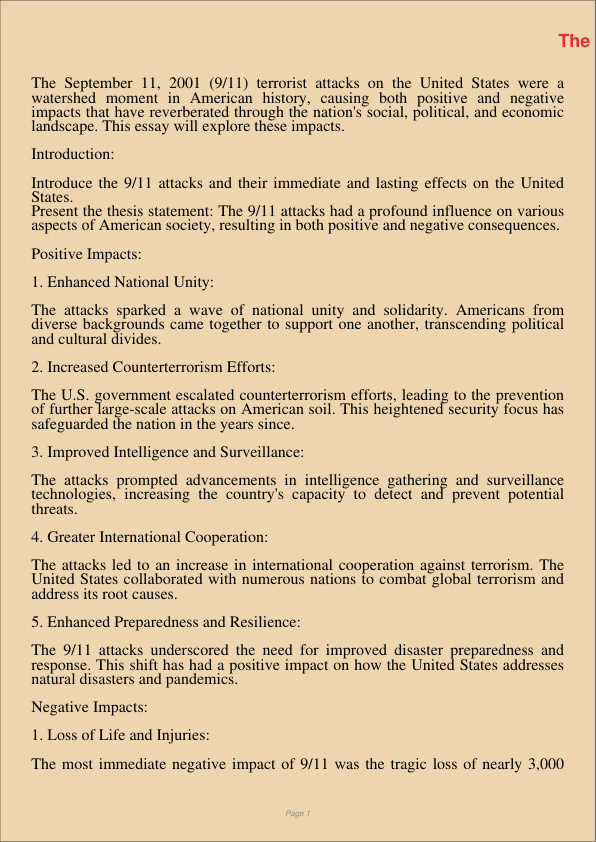The Positive And Negative Impacts Of The 911 Attacks On The United States
Jan 9, 2024
united states
negative impacts
Journalism & Communication
Psychology

The September 11, 2001 (9/11) terrorist attacks on the United States were a watershed moment in American history, causing both positive and negative impacts that have reverberated through the nation’s social, political, and economic landscape. This essay will explore these impacts.
Introduction:
Introduce the 9/11 attacks and their immediate and lasting effects on the United States. Present the thesis statement: The 9/11 attacks had a profound influence on various aspects of American society, resulting in both positive and negative consequences.
Positive Impacts:
- Enhanced National Unity:
The attacks sparked a wave of national unity and solidarity. Americans from diverse backgrounds came together to support one another, transcending political and cultural divides.
- Increased Counterterrorism Efforts:
The U.S. government escalated counterterrorism efforts, leading to the prevention of further large-scale attacks on American soil. This heightened security focus has safeguarded the nation in the years since.
- Improved Intelligence and Surveillance:
The attacks prompted advancements in intelligence gathering and surveillance technologies, increasing the country’s capacity to detect and prevent potential threats.
- Greater International Cooperation:
The attacks led to an increase in international cooperation against terrorism. The United States collaborated with numerous nations to combat global terrorism and address its root causes.
- Enhanced Preparedness and Resilience:
The 9/11 attacks underscored the need for improved disaster preparedness and response. This shift has had a positive impact on how the United States addresses natural disasters and pandemics.
Negative Impacts:
- Loss of Life and Injuries:
The most immediate negative impact of 9/11 was the tragic loss of nearly 3,000 lives and thousands of injuries, which had a profound emotional and social toll on the nation.
- Economic Consequences:
The attacks caused significant economic disruption, including stock market crashes, job losses, and a recession. The subsequent “War on Terror” also incurred immense financial costs.
- Erosion of Civil Liberties:
Heightened security measures led to concerns about the erosion of civil liberties. The USA PATRIOT Act and other policies were criticized for infringing on individual rights and privacy.
- Stigmatization and Discrimination:
The attacks fueled prejudice, discrimination, and violence against Arab and Muslim Americans. Racial and religious profiling became widespread concerns.
- Long-Term Psychological Impact:
The trauma of 9/11 has left a lasting psychological impact on those directly affected and the American population at large. Anxiety, post-traumatic stress disorder (PTSD), and heightened security concerns persist.
Conclusion:
The 9/11 attacks were a pivotal moment in U.S. history, leaving both positive and negative legacies. While they led to enhanced security, national unity, and international cooperation in the fight against terrorism, they also resulted in significant loss of life, economic repercussions, and the erosion of civil liberties. Acknowledging and addressing these impacts is crucial in understanding how 9/11 continues to shape the United States and its relationship with the rest of the world.